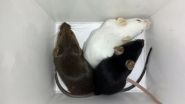A sweet bacterium keeps track of time
Researchers unravel the mystery of a sugar-coated bacterium
2014-11-18
(Press-News.org) Researchers are studying the Caulobacter crescentus bacterium because of its developmental process and cellular cycle, which serve as models for a number of pathogenic bacteria. They all have in common the use of polysaccharides to create a particularly effective protective envelope, or capsule. Professor Viollier's laboratory at the University of Geneva's (UNIGE) Faculty of Medicine has just unraveled the secrets of capsule formation during the cellular cycle and perhaps even identified potential Achilles' heel of bacteria. These results were published in the last edition of the eLife journal.
Silvia Ardissone, researcher in the Department of Microbiology and Molecular Medicine at UNIGE's Faculty of Medicine, works with Caulobacter crescentus, a bacterium that shows a particularly interesting cell division. In fact, as with eukaryotic organisms, division of Caulobacter cells generates two different daughter cells, which can be easily separated. Researchers take advantage of this feature to obtain populations of synchronized bacteria that can be used to study specific cell cycle processes.
The sugar capsule, typical of pathogens
Like other bacteria, including several pathogenic species, Caulobacter crescentus presents a capsular envelope made of polysaccharides (sugars). This envelope protects bacteria from viruses, as well as from the human immune system. Professor Patrick Viollier's team studies how cells produce the capsule at the right time and just identified some of the underlying regulatory mechanisms.
One of the daughter cells lacks the capsule
Of the two different daughter cells generated by Caulobacter at each cell division only one is equipped with the capsule. This is what scientists noticed, and now they can now explain the reasons behind such a difference. In fact, the researchers showed that the synthesis of the capsule is controlled by the same mechanisms that regulate the cell cycle, and identified the protein that inhibits the production of the sugar capsule in one of the daughter cells.
"An uncharted path seems to have opened for the development of a new kind of antibiotics, products that would imitate the action of this inhibitory protein," comments Silvia Ardissone, who also imagines a type of medicine that "would strip the pathogens," and therefore disarm an entire bacteriological spectrum.
INFORMATION:
[Attachments] See images for this press release:

ELSE PRESS RELEASES FROM THIS DATE:
2014-11-18
SALT LAKE CITY, Nov. 18, 2014 - When a viral infection spread through five genetically identical mice in a row, the virus replicated faster and became more virulent or severe. But when the infection spread one-by-one through five genetically diverse mice, the virus had trouble adapting and became less virulent.
By showing this long-suspected mechanism holds true within a single species of vertebrate animal, namely, mice, the University of Utah study suggests that increased genetic diversity should be promoted in livestock and in captive-bred endangered species so as to ...
2014-11-18
This news release is available in French. There is no significant difference in the prevalence of verbal abuse in the workplace between men and women, according to a systematic review of the literature conducted by researchers at the Institut universitaire de santé mentale de Montréal and the University of Montreal.
Verbal abuse is the most common form of workplace violence. It can lead to many consequences, particularly at the psychological and organizational levels. Several studies underline the importance of taking into account sociodemographic variables ...
2014-11-18
Ewing sarcoma is a cancer of bone or its surrounding soft tissue that primarily affects children and young adults. A hallmark of Ewing sarcoma is a translocation event that results in the fusion of an RNA binding protein, known as EWS, with a transcription factor, such as FLI1. Previous work suggested that the fusion protein EWS-FLI1 promoted cancer by changing gene expression; however, the gene targets were unknown. A new study in the Journal of Clinical Investigation indicates that a long noncoding RNA named Ewing sarcoma-associated transcript 1 (EWSAT1) is a critical ...
2014-11-18
Atherosclerosis is a leading cause of heart attacks and stroke. The narrowing of blood vessels that is caused by atherosclerosis can be treated with angioplasty or stenting to improve blood flow. However, the stenting process induces deleterious remodeling of the blood vessel that can increase thrombosis risk, limiting the use of this strategy. In an article published in the Journal of Clinical Investigation, a research team led by Ziad Ali of the Columbia University Medical Center now provides new insights into the pathological remodeling that occurs following blood ...
2014-11-18
PHILADELPHIA - Programming electronic health records to make generic drugs the default choice when physicians write prescriptions may offer one way to reduce unnecessary spending and improve health care value in the face of spiraling U.S. health expenditures, according to a new study from researchers in the Perelman School of Medicine, The Wharton School and the Center for Health Incentives and Behavioral Economics (CHIBE) at the University of Pennsylvania, and the Philadelphia VA Medical Center. The study is published in a special issue of Annals of Internal Medicine featuring ...
2014-11-18
This news release is available in French.
Montreal, November 17, 2014 - Resistance to antibiotics is an important health concern that affects both the spread of infections, like Clostridium difficile, and the medication budget. Researchers at the McGill University Health Centre (MUHC) examined the effectiveness of adopting an antibiotic "time-out" during treatment, which involves regularly re-evaluating the treatment strategy as the clinical situation evolves. The study, published in this month's issue of the Annals of Internal Medicine, showed that structured time-outs, ...
2014-11-17
Minneapolis, MN - November 17, 2014 - At the 2014 American Heart Association Scientific Sessions in Chicago, Ill., Minneapolis Heart Institute Foundation Research Cardiologist Dr. Michael Miedema gave a presentation entitled "The Implications of the Recent American College of Cardiology/American Heart Association Guidelines for the Treatment of Blood Cholesterol on a Rural Community: The Heart of New Ulm Project."
"The recently released cholesterol guidelines appear to have significantly increased the number of middle-aged adults who qualify for a cholesterol-lowering ...
2014-11-17
MAYWOOD, Ill. - Obesity is a known risk factor for atrial fibrillation, the most common heart rhythm disorder.
Obesity is commonly measured as a person's body mass index (BMI). But a Loyola University Medical Center study has found that the layer of fat around the outside of the heart is more closely associated with atrial fibrillation than BMI.
"Many people who would not be considered obese by their BMI nevertheless have high volumes of fat around their hearts, which could put them at risk for atrial fibrillation. Simple measures such as BMI may fail to completely ...
2014-11-17
CHICAGO - Most patients with implantable cardioverter defibrillators (ICDs)--small devices placed in a person's chest to help treat irregular heartbeats with electrical pulses, or shocks--haven't thought about device deactivation if they were to develop a serious illness from which they were not expected to recover. But given changes in healthcare, there may be a new reason to do so. A new study led by researchers in the Perelman School of Medicine at the University of Pennsylvania, which was presented today at the 2014 Scientific Sessions of the American Heart Association, ...
2014-11-17
We like to think of evolution as a fine-tuning process, one that whittles away genetic redundancies. The only problem is, we are not fine-tuned machines. Our bodies are chock-full of parts that either don't work anymore or are so buggy that our biology has Macgyvered a way to make it work.
Take our DNA. No, seriously, take our DNA. It's mostly garbage anyways. Fifty percent of our genome is comprised of genetic parasites, called transposable elements or transposons, that usually lie dormant. When they are allowed to move around the genome, they can wreak havoc on our ...
LAST 30 PRESS RELEASES:
[Press-News.org] A sweet bacterium keeps track of time
Researchers unravel the mystery of a sugar-coated bacterium


